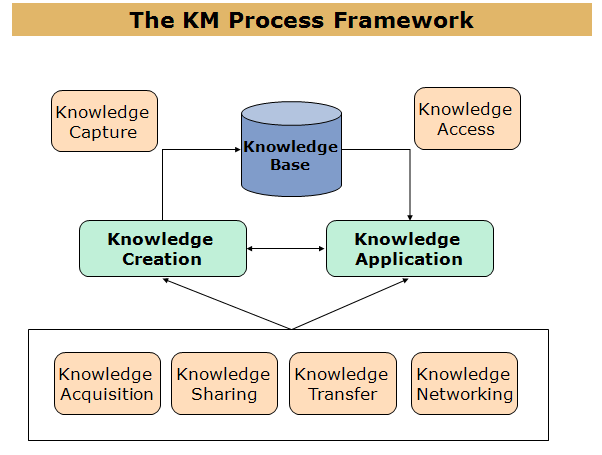Difference between revisions of "Education informatics"
Shawndouglas (talk | contribs) (Internal link.) |
Shawndouglas (talk | contribs) m (Fixed date/year issues in citations) |
||
| (5 intermediate revisions by the same user not shown) | |||
| Line 1: | Line 1: | ||
''( | [[File:KM Framework.png|thumb|380px|right|Understanding the knowledge management process from an information technology perspective is part of education informatics.]] | ||
'''Education informatics''' is an emerging sub-discipline of education and [[Informatics (academic field)|informatics]] that "incorporate[s] new technologies and learning strategies to enhance the capture, organization, and utilization of [[information]] within the field of education."<ref name="CollinsProp">{{cite journal |url=http://dash.harvard.edu/bitstream/handle/1/4569474/Collins%20Weiner%20TCR%202010.pdf |format=PDF |journal=Teachers College Record |title=Proposal for the Creation of a Subdiscipline: Education Informatics |author=Collins, John W.; Weiner, Sharon A. |volume=112 |issue=10 |pages=2523–2536 |year=2010 |accessdate=25 April 2014}}</ref> While this sub-discipline typically covers K-12 and higher education, it is easily expanded to business- and enterprise-level education. | |||
Education informatics encompasses<ref name="NorooziDev">{{cite book |url=http://books.google.com/books?id=7-Uk856pb0gC&pg=PA22 |chapter=Chapter 1: The Development and Applications of E-Learning Technology Standards |title=Education for a Digital World: Present Realities and Future Possibilities |author=Noroozi, B.; Haghi, A. K.; Luppicini, Rocci (ed.) |publisher=CRC Press |year=2012 |pages=22–23 |isbn=9781926895109 |accessdate=25 April 2014}}</ref>: | |||
* logistics and administration; | |||
* systems development (e.g. teaching/learning platforms and assessment tools); | |||
* meta-systems development (e.g. curriculum maps and outcome frameworks); | |||
* content and knowledge management; and | |||
* standards development. | |||
Note that "education informatics" is distinct from "informatics education," a term that relates more to the practice of teaching and/or learning about informatics, rather than the use of [[information]] science and technology in the support of teaching and learning. | |||
==History== | |||
The term "education informatics" first appeared in 1980<ref name="CarrPolicy">{{cite journal |url=https://www.tcrecord.org/library/abstract.asp?contentid=15876 |journal=Teachers College Record |title=Policy Implications of Education Informatics |author=Carr, Jo Ann; O'Brien, Nancy P. |volume=112 |issue=10 |pages=2703–2710 |year=2010 |accessdate=25 April 2014}}</ref>, though it wasn't used much until around the mid-2000s. In 2003 and 2004, Nigel Ford and his research team at the Department of Information Studies at the University of Sheffield began researching and publishing information about the scope and learning models of education informatics. "Educational informatics research," the team said, "is concerned with the relationships between people, information, [information and communication technologies], learning and professional practice at the level of individual and social action, and in diverse organizational and institutional settings."<ref name="FordEI03">{{cite journal |url=http://jis.sagepub.com/content/29/4/298.full.pdf+html |journal=Journal of Information Science |title=Educational informatics: an emerging research agenda |author=Levy, Philippa; Ford, Nigel; Foster, Jonathon; Madden, Andrew; Miller, David; Nunes, Miguel Baptista; McPherson, Maggie; Webber, Sheila |volume=29 |issue=4 |pages=298–310 |year=2003 |doi=10.1177/01655515030294006 |accessdate=25 April 2014}}</ref><ref name="FordEI04">{{cite journal |url=http://www.emeraldinsight.com/journals.htm?articleid=864244 |journal=Journal of Documentation |title=Towards a model of learning for educational informatics |author=Ford, Nigel |volume=60 |issue=2 |pages=183–225 |year=2004 |doi=10.1108/00220410410522052 |accessdate=25 April 2014}}</ref> | |||
{{As of|2014}}, events like the International Symposium on Education Informatics and iConference have brought the discussion on education informatics to a much larger international audience.<ref name="ISEI14">{{cite web |url=http://icacci-conference.org/website/isei2014 |title=Second International Symposium on Education Informatics (ISEI - 2014) |publisher=IEEE |date=2014 |accessdate=25 April 2014}}</ref><ref name="MardisMapping">{{cite journal |url=https://www.ideals.illinois.edu/bitstream/handle/2142/47379/392_ready.pdf |format=PDF |journal=iConference 2014 Proceedings |title=Mapping an Agenda for Education Informatics in the K-12 Domain |author=Mardis, Marcia A. |pages=1108–1112 |year=2014 |doi=10.9776/14392 |accessdate=25 April 2014}}</ref> | |||
==References== | |||
<references /> | |||
[[Category:Informatics]] | [[Category:Informatics]] | ||
Latest revision as of 15:54, 4 January 2024
Education informatics is an emerging sub-discipline of education and informatics that "incorporate[s] new technologies and learning strategies to enhance the capture, organization, and utilization of information within the field of education."[1] While this sub-discipline typically covers K-12 and higher education, it is easily expanded to business- and enterprise-level education.
Education informatics encompasses[2]:
- logistics and administration;
- systems development (e.g. teaching/learning platforms and assessment tools);
- meta-systems development (e.g. curriculum maps and outcome frameworks);
- content and knowledge management; and
- standards development.
Note that "education informatics" is distinct from "informatics education," a term that relates more to the practice of teaching and/or learning about informatics, rather than the use of information science and technology in the support of teaching and learning.
History
The term "education informatics" first appeared in 1980[3], though it wasn't used much until around the mid-2000s. In 2003 and 2004, Nigel Ford and his research team at the Department of Information Studies at the University of Sheffield began researching and publishing information about the scope and learning models of education informatics. "Educational informatics research," the team said, "is concerned with the relationships between people, information, [information and communication technologies], learning and professional practice at the level of individual and social action, and in diverse organizational and institutional settings."[4][5]
As of 2014[update], events like the International Symposium on Education Informatics and iConference have brought the discussion on education informatics to a much larger international audience.[6][7]
References
- ↑ Collins, John W.; Weiner, Sharon A. (2010). "Proposal for the Creation of a Subdiscipline: Education Informatics" (PDF). Teachers College Record 112 (10): 2523–2536. http://dash.harvard.edu/bitstream/handle/1/4569474/Collins%20Weiner%20TCR%202010.pdf. Retrieved 25 April 2014.
- ↑ Noroozi, B.; Haghi, A. K.; Luppicini, Rocci (ed.) (2012). "Chapter 1: The Development and Applications of E-Learning Technology Standards". Education for a Digital World: Present Realities and Future Possibilities. CRC Press. pp. 22–23. ISBN 9781926895109. http://books.google.com/books?id=7-Uk856pb0gC&pg=PA22. Retrieved 25 April 2014.
- ↑ Carr, Jo Ann; O'Brien, Nancy P. (2010). "Policy Implications of Education Informatics". Teachers College Record 112 (10): 2703–2710. https://www.tcrecord.org/library/abstract.asp?contentid=15876. Retrieved 25 April 2014.
- ↑ Levy, Philippa; Ford, Nigel; Foster, Jonathon; Madden, Andrew; Miller, David; Nunes, Miguel Baptista; McPherson, Maggie; Webber, Sheila (2003). "Educational informatics: an emerging research agenda". Journal of Information Science 29 (4): 298–310. doi:10.1177/01655515030294006. http://jis.sagepub.com/content/29/4/298.full.pdf+html. Retrieved 25 April 2014.
- ↑ Ford, Nigel (2004). "Towards a model of learning for educational informatics". Journal of Documentation 60 (2): 183–225. doi:10.1108/00220410410522052. http://www.emeraldinsight.com/journals.htm?articleid=864244. Retrieved 25 April 2014.
- ↑ "Second International Symposium on Education Informatics (ISEI - 2014)". IEEE. 2014. http://icacci-conference.org/website/isei2014. Retrieved 25 April 2014.
- ↑ Mardis, Marcia A. (2014). "Mapping an Agenda for Education Informatics in the K-12 Domain" (PDF). iConference 2014 Proceedings: 1108–1112. doi:10.9776/14392. https://www.ideals.illinois.edu/bitstream/handle/2142/47379/392_ready.pdf. Retrieved 25 April 2014.










